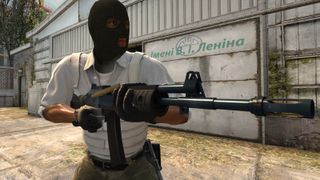Valve bans seven CS:GO pro players from tournament play for match fixing

Seven professional Counter-Strike: Global Offensive players have been banned from Valve-sponsored events, including the upcoming ESL One Katowice. The bans come as the result of an August 2014 match between iBUYPOWER and NetcodeGuides.com, which has now been confirmed as having been fixed.
The allegations were detailed last week by The Daily Dot, with evidence that included screen caps of current Cloud9 player Shahzeb "ShahZam" Khan acknowledging that he was given advance notice of the outcome. Players involved in the fix used "smurf accounts" to place high-value bets on the match through the CS:GO Lounge, according to the claims, which have now been substantiated by the powers that be at Valve.
"We can confirm, by investigating the historical activity of relevant accounts, that a substantial number of high valued items won from that match by Duc 'cud' Pham were transferred (via Derek 'dboorn' Boorn) to iBUYPOWER players and NetCodeGuides founder, Casey Foster," Valve wrote on the CS:GO blog. "All together, the information we have collected and received makes us uncomfortable continuing any involvement with these individuals."
Seven players will be excluded from "participation in any capacity in Valve-sponsored events," according to the post:
- Duc “cud” Pham
- Derek “dboorn” Boorn
- Casey Foster
- Sam “Dazed” Marine
- Braxton “swag” Pierce
- Keven “AZK” Larivière
- Joshua “Steel” Nissan
Valve also laid out the ethical obligations of pro players, managers, and team staff, who "should under no circumstances gamble on CS:GO matches, associate with high volume CS:GO gamblers, or deliver information to others that might influence their CS:GO bets."
"As CS:GO grows, it’s important to consider the substantial impact an individual professional Counter-Strike player has on the health and stability of their sport," it wrote. "Performing before an audience of millions of fans, they are ambassadors for their game – the strength of professional Counter-Strike comes from the integrity of its players and teams."
The ESL, which recently announced a $250,000 prize pool for the upcoming CS:GO Katowice 2015 tournament, confirmed on Reddit that it would uphold the ban. "Like the blog post said, none of these players will be able to participate or contribute in any other form to ESL One Katowice or future Majors run by us, and we are currently finalising our verdict regarding other ESL leagues and these players," ESL rep theflyingdj wrote. "We do not have any tolerance for match fixing, have always made clear in our rules that players are not to be involved with any kind of betting and will continue to work on a clean and fair competitive environment for CS:GO."
The biggest gaming news, reviews and hardware deals
Keep up to date with the most important stories and the best deals, as picked by the PC Gamer team.
The ESEA has also issued bans against the seven players in question, saying that while the bans are currently set for one year, it reserves the right to extend them indefinitely. It noted that it has since implemented its own policy explicitly forbidding players, managers, and sponsors from betting on their own matches, adding, "We strongly encourage all organizations, regardless of their affiliation with Valve, to mirror and enforce these bans so that a clear message is sent—there is no place for match fixing in professional gaming."
The number of players affected by the ban is relatively small, but the severity of the punishment sends an unmistakable message that match fixing will not be tolerated. Given the growing popularity of professional CS:GO, and the ballooning value of purses attached to tournaments like Katowice, it's a welcome development—and, I'd say, long overdue.
Andy has been gaming on PCs from the very beginning, starting as a youngster with text adventures and primitive action games on a cassette-based TRS80. From there he graduated to the glory days of Sierra Online adventures and Microprose sims, ran a local BBS, learned how to build PCs, and developed a longstanding love of RPGs, immersive sims, and shooters. He began writing videogame news in 2007 for The Escapist and somehow managed to avoid getting fired until 2014, when he joined the storied ranks of PC Gamer. He covers all aspects of the industry, from new game announcements and patch notes to legal disputes, Twitch beefs, esports, and Henry Cavill. Lots of Henry Cavill.
Most Popular







